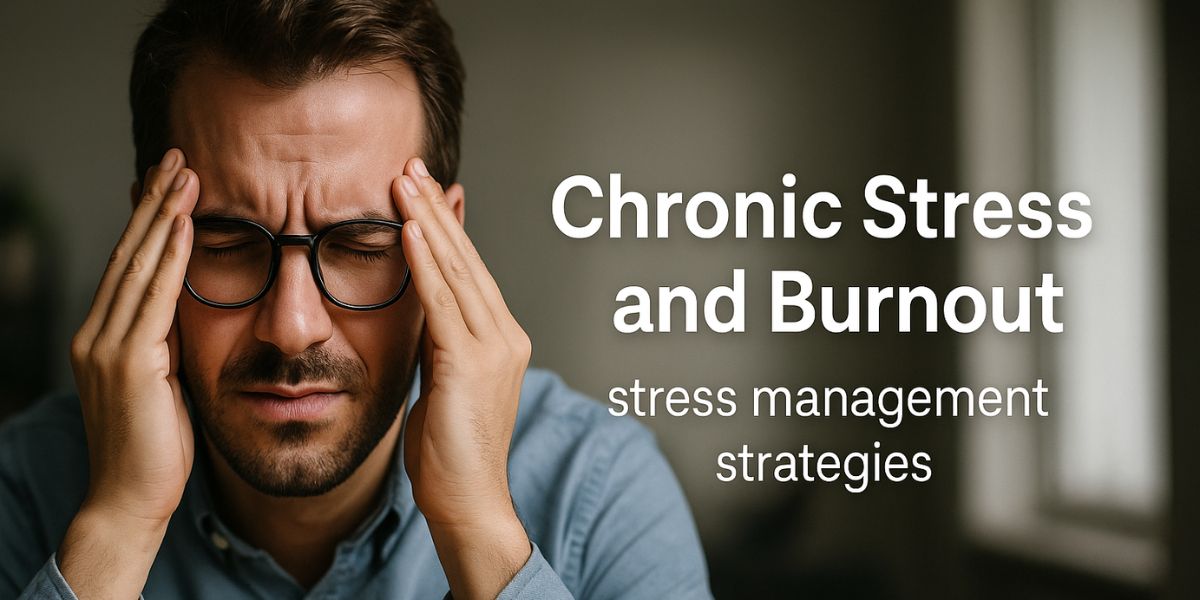In our constantly connected and fast-paced lives, stress has become a daily reality for most people. While experiencing stress occasionally is normal, chronic stress and burnout indicate that your mental and physical well-being may be under serious strain. Recognizing these signs early and applying the right stress management strategies can help restore balance and promote long-term wellness.
What is Chronic Stress?
Chronic stress refers to a prolonged feeling of pressure and overwhelm that doesn’t go away over time. Unlike acute stress, which is brief and usually linked to specific events, chronic stress can persist for extended periods—sometimes months or years. It often stems from continuous challenges such as demanding workloads, unresolved conflicts, financial burdens, or emotionally draining relationships.
When the body remains in a constant state of fight-or-flight, it can eventually result in serious health concerns such as insomnia, digestive disturbances, high blood pressure, heart conditions, and a weakened immune system. That’s why consistent stress management strategies are essential for protecting overall health.
What is Burnout ?
Burnout is a state of emotional, mental, and physical exhaustion caused by ongoing stress, particularly in the workplace. It can also result from long-term caregiving, academic stress, or persistent emotional strain.
The main signs of burnout include:
-
Emotional fatigue – feeling drained and overwhelmed emotionally
-
Detachment or cynicism – losing interest or becoming negative toward responsibilities
-
Decreased efficiency – struggling with productivity and self-confidence
Unlike regular tiredness, burnout doesn’t improve with short-term rest. It requires intentional recovery and sustained stress management strategies to heal fully.
- Emotional exhaustion – feeling drained, overwhelmed, and emotionally depleted.
- Depersonalization – becoming cynical, detached, or apathetic toward your responsibilities.
- Reduced performance – decreased productivity, motivation, and self-confidence.
Unlike simple tiredness, burnout doesn’t go away with a few nights of rest. It requires deeper recovery and behavioral changes.
When to Seek Help: Key Signs You Need Stress Management Strategies
It’s important to recognize when stress and burnout are no longer manageable on your own. Here are red flags:
- Frequent headaches or digestive problems
- Difficulty sleeping or constant fatigue
- Feeling anxious, irritable, or hopeless
- Losing interest in hobbies or social interactions
- Decline in work performance or absenteeism
- Using alcohol, food, or substances to cope
If these signs persist, it’s time to consider professional support and implement consistent stress management strategies.

Effective Stress Management Strategies for Chronic Stress and Burnout
The good news is that stress and burnout are manageable with awareness, action, and support. Here are practical steps:
1. Acknowledge and Accept
The first step is to recognize that you’re struggling. Denial only prolongs the damage. Acknowledging stress gives you the power to take control.
2. Identify Stress Triggers
Keep a journal to track what causes your stress. Is it a toxic work environment? Lack of boundaries? Financial pressure? Identifying triggers helps tailor your stress management strategies.
3. Set Boundaries
Learn to say “no” and protect your time. Avoid overcommitting to work or personal obligations. Setting healthy boundaries is one of the most essential stress management strategies to prevent burnout.
4. Talk to Someone
Whether it’s a friend, mentor, or therapist, talking helps unload emotional weight. Mental health professionals can guide you with effective stress management strategies tailored to your situation.
5. Take Breaks and Rest
Breaks are not a luxury — they are necessary for recovery. Micro-breaks during the day, screen-free weekends, or short vacations can reset your system and enhance productivity.
6. Adopt Relaxation Techniques
Incorporate daily relaxation practices like deep breathing, meditation, or progressive muscle relaxation. These techniques are scientifically backed stress management strategies that calm the nervous system.
7. Stay Active
Physical activity is a powerful antidote to stress. Exercise boosts mood-regulating chemicals like endorphins and reduces cortisol levels. Even a 30-minute walk daily can be a game-changer in your stress management strategies.
8. Eat Mindfully
Nutrition plays a major role in mental health. Avoid excessive caffeine, sugar, and processed food. Choose balanced meals rich in omega-3s, magnesium, and B vitamins to support stress resilience.
9. Create a Supportive Environment
Surround yourself with people who uplift and understand you. A toxic or overly demanding environment can sabotage your stress management strategies.
10. Seek Professional Help
When stress interferes with daily life, professional therapy or counseling can offer deeper healing. Therapists can introduce cognitive behavioral techniques and other stress management strategies for lasting recovery.
Healthy Tips to Avoid Burnout and Chronic Stress
Prevention is always better than cure. Integrate these habits into your daily life to stay ahead of stress:
- Follow a consistent sleep routine. Quality sleep is foundational to every stress recovery plan.
- Practice gratitude. Start or end the day by noting things you’re thankful for. It shifts focus from problems to positivity.
- Unplug regularly. Reduce digital clutter by taking breaks from emails, social media, and screens.
- Pursue hobbies. Creative activities like painting, gardening, or reading nourish your inner self.
- Laugh often. Laughter reduces stress hormones and boosts immunity.
- Practice time management. Use to-do lists, calendars, or productivity apps to stay organized and reduce anxiety from forgotten tasks.
These habits act as long-term stress management strategies that prevent you from reaching the point of exhaustion.
When Should You Seek Help?
While mild stress can be handled through lifestyle adjustments, seek professional help if:
- You feel overwhelmed most days
- Your physical health is declining
- You experience panic attacks or suicidal thoughts
- Your relationships or work are suffering
There’s no shame in seeking help. In fact, reaching out shows strength and self-awareness. Mental health care is as important as physical care — and both benefit from proactive stress management strategies.
Conclusion
Chronic stress and burnout are modern-day epidemics that don’t just affect your work, but your entire life. The earlier you identify the signs and adopt proven stress management strategies, the better you protect your health and happiness. From setting boundaries and moving your body to seeking therapy when needed — small daily actions can lead to powerful transformations.
Don’t wait for a breakdown to make a breakthrough. Start today. Your mind and body will thank you tomorrow.





